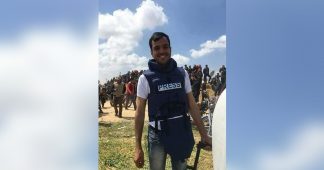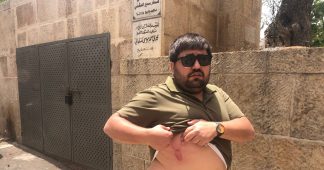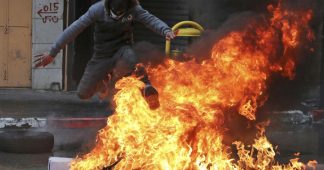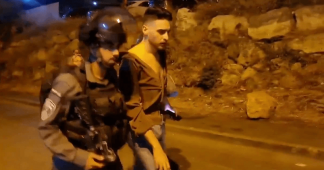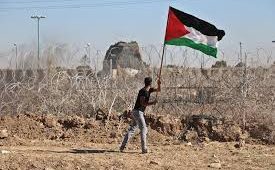By
JERUSALEM (AP) — Israeli soldiers held an Associated Press photographer against his will during clashes in the occupied West Bank earlier this week, in a spot where Palestinian protesters were hurling stones and the troops were firing tear gas and rubber-coated bullets.
The Israeli military said the photographer interfered with an operation and was detained after ignoring soldiers’ requests to move. It said soldiers moved him behind a barrier to protect him from stones being thrown by the demonstrators.
AP photographer Majdi Mohammed was covering ongoing demonstrations in the town of Beita against a nearby Israeli settlement outpost on June 27. He was wearing a helmet and a protective vest that clearly identified him as a reporter.
He came across a group of soldiers on the edge of Beita, around 3 kilometers (2 miles) from the outpost, who were using a bulldozer to set up a roadblock. He said the soldiers told him he could take pictures. Mohammed has been an AP staff photographer since 2006, and has spent even longer covering conflict in the West Bank.
A short while later, protesters hurled a volley of stones at the soldiers. An Israeli officer ordered Mohammed to stay where he was and get down on the ground.
Mohammed said the officer told him he was being detained, and that the soldiers were keeping him there so the protesters would not throw rocks at them. Mohammed said he informed the officer that this was unlawful and amounted to using him as a human shield.
International law forbids forcibly placing civilians near military targets to deter attacks. In 2005, Israel’s Supreme Court outlawed the long-standing practice of using Palestinian civilians in military operations, including the “neighbor procedure,” whereby soldiers would send a Palestinian civilian to the home of a wanted militant to order him out. The Israeli rights group B’Tselem says soldiers have occasionally used such practices in the years since.
Mohammed said that stones rained down on the area where he was being held, with one striking his leg, as the soldiers fired tear gas and rubber-coated bullets. “I was terrified because the stones were falling all around and the soldier was firing from a meter (yard) away,” he said.
Mohammed called Oded Balilty, the AP’s chief photographer for Israel and the Palestinian territories, who spoke to the Israeli officer. The officer said Mohammed had been detained because he interfered in the soldiers’ work. Balilty asked the officer to release Mohammed, saying he would leave the area immediately. The officer told Balilty that Mohammed was safe and would be released soon.
About 15 minutes later, Mohammed again called Balilty, who asked the officer to release him. “We don’t work for you, we’ll release him when we’re done,” the officer said, according to Balilty.
Mohammed was detained for a total of about one hour, and the whole time there were stones being thrown and shots fired. Before releasing him, Mohammed says the officer demanded to see the pictures on his camera and ordered him to delete any showing the officer’s face, a violation of press freedom.
“It is unacceptable that AP photographer Majdi Mohammed was held against his will under dangerous circumstances by Israeli soldiers while simply trying to do his job,” said Ian Phillips, AP’s vice president and head of international news. “The AP has submitted a detailed account of the incident and calls on the Israeli military to hold itself accountable.”
In a statement released Thursday, the military said the photographer had been “detained and moved behind the troops to a safer place” after interfering with their work. It said Mohammed was “certainly not asked, as alleged, to stand by the troops in order to ‘serve as a shield.’”
It denied that Mohammed was asked to delete images. It said he was asked not to take pictures, saying “the request was wrong, and this has since been made clear to the commanding officer.” The military said it “greatly respects the freedom of the press.”
Published at www.yahoo.com
